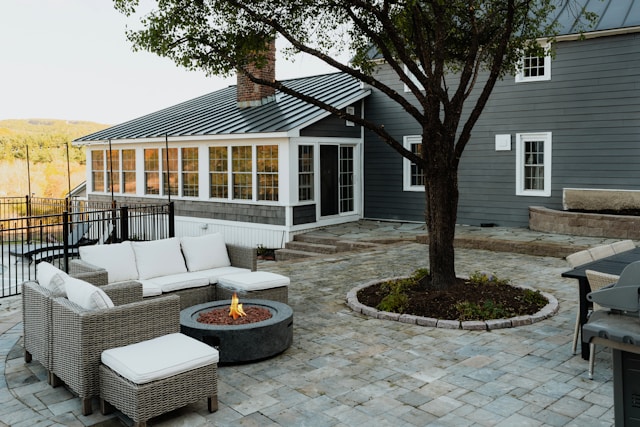
Outdoor living spaces provide the ideal backdrop for relaxing, entertaining, and connecting with nature. But over time, exposure to weather, dirt, pollen, and organic buildup can take a toll, dulling their appearance and accelerating wear. Preserving the beauty and functionality of these areas is key to enjoying them year-round and extending their lifespan.
While traditional cleaning methods often rely on harsh chemicals that can damage surfaces, harm the environment, and pose risks to your family and pets, there are better alternatives. Services like Atlanta power washing offer powerful, eco-conscious cleaning solutions that effectively restore outdoor spaces without resorting to toxic products.
Chemical cleaners such as bleach, ammonia, strong acids, and synthetic detergents may offer fast results, but they come with several downsides:
Environmental Impact: Runoff from chemicals can enter storm drains, contaminating local waterways and harming aquatic life.
Health Concerns: Harsh chemicals release fumes and residues that can irritate skin, eyes, and respiratory systems.
Surface Damage: Overuse or improper dilution can degrade wood, stone, paint, or metal finishes.
Wildlife Hazard: Pets, beneficial insects, and garden wildlife may be exposed to toxic substances lingering on surfaces.
These risks make it crucial to explore alternative cleaning and maintenance options that minimize chemical use while delivering excellent results.
Before choosing any cleaning or maintenance approach, it’s important to understand the materials used in your outdoor living space and their specific needs:
Wood Decks and Furniture: Require gentle cleaning to avoid splintering and warping.
Stone or Brick Patios: Can tolerate more vigorous scrubbing but are sensitive to acidic cleaners.
Concrete Surfaces: Durable but prone to staining and require proper sealants.
Metal Railings and Fixtures: May rust or corrode if exposed to harsh chemicals.
Fabric Cushions and Umbrellas: Need mild detergents to preserve color and texture.
Matching your cleaning methods to the material ensures effectiveness and prevents unintended damage.
Several natural substances have proven effective at cleaning outdoor surfaces, controlling mold and mildew, and removing stains without the hazards of harsh chemicals.
White vinegar is an excellent all-purpose cleaner. Its mild acidity helps break down mineral deposits, mildew, and dirt.
How to Use: Mix equal parts white vinegar and water in a spray bottle. Apply to surfaces like stone patios, vinyl siding, or deck railings, let sit for 10 minutes, then scrub gently and rinse.
Precautions: Avoid using vinegar on natural stone such as marble or limestone, as it can etch the surface.
Baking soda works as a gentle abrasive and deodorizer.
How to Use: Sprinkle baking soda on stained areas of wood decks or concrete patios, then scrub with a damp brush. For mold, combine with water to form a paste and apply directly.
Benefits: Non-toxic and safe around pets and plants.
Castile soap is a plant-based, biodegradable liquid soap suitable for delicate fabrics and surfaces.
How to Use: Mix a few tablespoons with warm water and use a soft brush or sponge to clean outdoor furniture cushions, umbrellas, or vinyl surfaces.
Advantages: Mild enough for regular use and effective at cutting through grease and grime.
Oxygen-based cleaners (often labeled as “oxygen bleach”) release oxygen to break down organic stains like mildew and pollen without toxic fumes.
How to Use: Follow manufacturer instructions for dilution, apply to affected areas, scrub lightly, and rinse.
Eco Benefits: Safer for the environment than chlorine bleach.
For heavily soiled surfaces, high-pressure water cleaning is a powerful and chemical-free option.
How to Use: A pressure washer can be used on hard surfaces like concrete patios, driveways, decks, and siding. The strong stream of water effectively blasts away dirt, mold, algae, and grime without the need for harsh cleaners.
Tips: Use the correct nozzle and pressure setting for each surface to avoid damage and test a small area first.
Bonus: Consider hiring professional services to ensure safe and thorough results for large or delicate areas.

Start with basic maintenance by sweeping debris, leaves, and dirt regularly. This prevents organic buildup that fosters mold and algae growth. Use soft-bristle brooms or handheld brushes to avoid scratching surfaces.
Use a garden hose with a spray nozzle set to moderate pressure to rinse surfaces. For stubborn dirt, mix a mild soap solution with one of the natural cleaners above, then scrub gently with brushes suited to your surface type.
Different stains require different approaches:
Grease/Oil: Absorb fresh spills with baking soda or cornstarch, then scrub with Castile soap and warm water.
Rust: Use lemon juice combined with baking soda, apply paste, let sit, scrub, and rinse.
Water Stains: Vinegar-water solutions often dissolve mineral deposits on stone or concrete.
Sealants and Stains: Use eco-friendly, low-VOC sealers or stains on wood and stone surfaces to protect from moisture and UV damage.
Furniture Covers: Protect cushions and furniture with breathable covers to reduce dirt accumulation.
Strategic Landscaping: Plant trees or shrubs to provide shade but allow air circulation.
Keeping your outdoor living spaces beautiful over time requires more than just cleaning. Sustainable maintenance practices help preserve your investment and minimize environmental impact.
Check your deck, patio, and furniture periodically for early signs of wear, mold, or damage. Early intervention prevents costly repairs later.
Ensure that rainwater flows away from your outdoor areas to prevent standing water, which fosters mold and wood rot.
For wooden surfaces, consider natural oils like tung oil or linseed oil to nourish and protect the wood without harsh chemicals.
When replacing decking boards, furniture, or fabrics, choose recycled or sustainably sourced materials.
Adopting chemical-free and natural maintenance methods provides multiple benefits:
Healthier Living Environment: Reduced exposure to toxic chemicals helps protect family and pets.
Environmental Stewardship: Minimizes pollution and conserves ecosystems around your home.
Cost Savings: Many natural cleaning ingredients like vinegar and baking soda are inexpensive and widely available.
Preserves Surface Integrity: Gentle methods extend the life of your outdoor materials.
For stubborn stains, extensive mold infestations, or large-scale cleaning, professional services specializing in eco-friendly methods can be a great option. These experts use specialized equipment and green cleaning agents that balance effectiveness with safety.
Maintaining your outdoor living spaces without harsh chemicals is not only achievable but highly rewarding. With thoughtful care, natural cleaning agents, and sustainable practices, you can keep your decks, patios, and garden areas inviting and vibrant without compromising health or the environment.
By embracing these methods, you’re investing in a safer home, a healthier planet, and a lasting enjoyment of your outdoor oasis. Start today with simple, natural cleaning steps and watch your outdoor living spaces flourish beautifully all year long.